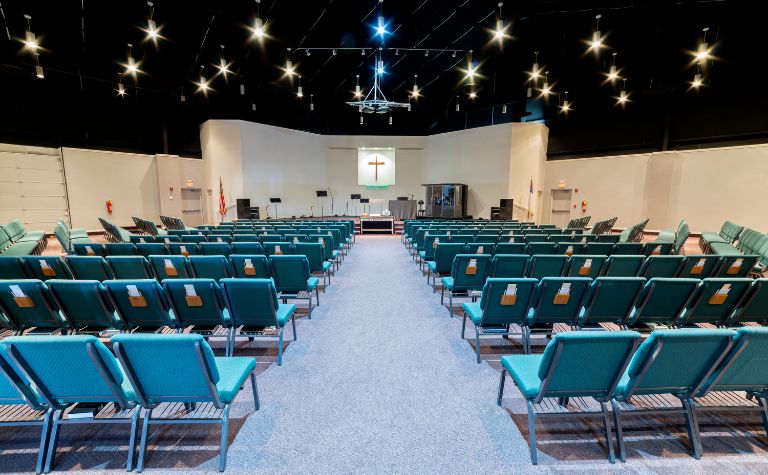The terms “Assemblies of God” and “evangelical” are used today to describe certain Christian churches. Some people may even use both terms to describe the same church, yet they have different meanings. This leads many people to wonder what the difference is between the names.
“Assemblies of God” is the name of a Pentecostal denomination. The term “evangelical” describes a 20th-century Christian movement marked by conservative theology and cultural engagement. Assemblies of God churches are evangelical, but there are also many evangelical churches outside the Assemblies of God denomination.
What exactly makes a church evangelical? Even though the Assemblies of God is a denomination and evangelicalism is a movement, how do their origins, organization, and worldviews compare? Do they have the same beliefs about the Trinity, Scripture, the Second Coming of Christ, and other important doctrines? Keep reading to learn more.

Assemblies of God vs. Evangelical Comparison
The Assemblies of God denomination has a clear, concise, well-defined doctrinal statement (see below). Evangelicalism is a movement with no central organization or leadership structure. (Also see Assemblies of God vs. Pentecostal: What’s the Difference?)
As a result, when discussing what evangelicalism is and isn’t, it’s best to talk about the contours and boundaries of the movement because there isn’t agreement on many particulars. In general, evangelical Christianity is comprised of these core convictions:
- Evangelism and conversion: moments in which people convert to Christianity, such as by means of an “altar call, for example,” have been central to evangelicalism for more than a century. Some of evangelicalism’s most notable figures have been evangelists like Billy Graham, who calls on people to convert by accepting Jesus Christ as their Lord and Savior. An important aspect of conversions in evangelical thinking is the importance of each individual personalizing their faith in Christ.
- Social and cultural engagement: engagement or activism has always been important to evangelical Christianity. The movement has sought to influence people groups in need for the sake of the gospel. Being “missional” is an important evangelical value.
- The Bible is the ultimate authority: historically, evangelicalism has held a high view of Scripture. It doesn’t consider church tradition to be on par with Scripture in terms of authority.
- The centrality of the cross: the cross of Christ is the centerpiece of the gospel for evangelicals.
| OVERVIEW | Assemblies of God | Evangelical |
|---|---|---|
| Origin | Pentecostal pastors and leaders who had strong convictions that speaking in tongues was evidence of a post-conversion baptism of the Holy Spirit, organized in Hot Springs, Arkansas, in 1914. | The modern use of the term originated in the 20th century. It’s distinguished from liberal and fundamentalist movements. Fundamentalism has similar theology to evangelicalism. |
| Early influencer(s) | Charles Fox Parham (1873-1929), Agnes Ozman (1870–1937), William Joseph Seymour (1870-1922) | Evangelical isn’t a denomination but a movement involving several conservative denominations that subscribe to a gospel-centered theology and ministry model. |
| Meaning of name | “Assemblies” refers to individual churches. “God” refers to the denomination’s beliefs about God as he is revealed in the Bible. | The word “evangelical” comes from the Greek word euangelion meaning gospel or good news. The term describes a gospel-centered or cross-centered worldview. |
| Significant writing outside the Bible | “The 16 Fundamental Truths” is the name of the denomination’s belief statement. | Numerous works from a variety of denominations emphasize a gospel-centered approach to evangelism, missions, biblical interpretation, and more. |
| Organization | Assemblies of God churches are organized according to presbyterian polity (though not theology) at the national level as well as the regional or district level. Individual churches, however, are self-governing. | Evangelicalism isn’t a denomination but a movement consisting of numerous denominations and even non-denominational churches. |
| Divisions | Compared with other large Protestant denominations, the Assemblies of God has been free of significant splits. The internal debate has occurred over a number of issues, but the denomination has avoided large protesting factions. | There is significant diversity within evangelical Christianity. Evangelical churches can have different theologies (though they are mostly Protestant), organizational models, and convictions on social issues. |
| Theological and Social worldview | The Assemblies of God denomination is evangelical and conservative, theologically and socially. The denomination ordains women to be pastors, which some Christians consider liberal and progressive. | Historically, evangelical churches are conservative theologically and socially. In recent years, some self-identifying evangelical churches have drifted from conservative theology and adopted modern social values on a variety of issues. |
Also see Assemblies of God vs. Non-Denominational: What’s the Difference?

Assemblies of God vs. Evangelical Beliefs, Theology, and Doctrine
| BELIEFS | Assemblies of God | Evangelical |
|---|---|---|
| Theology (general) | Assemblies of God is Protestant. They believe that salvation is by grace through faith in Christ alone and not according to works. They reject the authority of the Pope and disagree with the theology of the Eucharist in Catholicism. | Evangelical churches are mostly Protestant. Some non-Protestant churches are described as evangelical, though some of their theology is different. |
| Theology (specific) | Assemblies of God is Arminian. Within the framework of Arminianism, their belief systems is often referred to as “Pentecostal theology.” | Evangelical churches can be Arminian, Calvinist, or Baptist. Most non-denominational churches are also evangelical. |
| God | Trinitarian. There is one God who exists in three persons. | Same |
| Jesus | Jesus is the second person of the Trinity. He is God in human flesh. He is 100% God and 100% man. Jesus was born of a virgin, lived a sinless life, died as an atonement for sin, and was physically resurrection on the third day. | Same |
| Is the Holy Spirit God? | The Holy Spirit is the third person of the Trinity. He is fully divine. The Spirit applies the salvation that the Father planned and that the Son earned for sinners. He bestows spiritual gifts on believers that they are to use for the edification of the Church. | Same |

| BELIEFS | Assemblies of God | Evangelical |
|---|---|---|
| Speaking in tongues | The Assemblies of God believes that speaking in tongues is the initial evidence of baptism in the Holy Spirit, which they believe occurs after conversion. | Some evangelical churches practice speaking in tongues, and some don’t. |
| The Bible | #1 of The 16 Fundamental Truths state, “The Scriptures, both the Old and New Testaments, are verbally inspired of God and are the revelation of God to man, the infallible, authoritative rule of faith and conduct.” | Historically, all evangelical churches have a high view of Scripture, even if they don’t always use the terms “inerrancy” and “infallibility.” |
| Sin | #4 of The 16 Fundamental Truths state: “Man by voluntary transgression fell and thereby incurred not only physical death but also spiritual death, which is separation from God.” This is also referred to as the doctrine of Original Sin. | Historically, all evangelical churches have held to the doctrine of original sin, but not all have held to Total Depravity. |
| View of the atonement | Assemblies of God believes in the penal-substitutionary atonement of Christ. His death was the punishment for sin, and he took the place of sinners on the cross. Assemblies of God believes the application of the atonement occurs within the framework of Arminian theology. | Historically, evangelical churches have held to a penal-substitutionary atonement. The cross of Christ was originally the center of the movement. |
| Salvation | #5 of The 16 Fundamental Truths state, “Salvation is received through repentance toward God and faith toward the Lord Jesus Christ. By the washing of regeneration and renewing of the Holy Spirit, being justified by grace through faith, man becomes an heir of God, according to the hope of eternal life.” | Historically, evangelical churches believe that salvation is by grace through faith in Christ alone. |
| BELIEFS | Assemblies of God | Evangelical |
|---|---|---|
| Spiritual gifts | Assemblies of God believes that all spiritual gifts mentioned in the Bible are operational today, including speaking in tongues, divine healing, and miracles. | Evangelical churches have a variety of beliefs about spiritual gifts. Some believe all spiritual gifts mentioned in the Bible are operational today, while others don’t. |
| Water Baptism | Sometimes referred to as “credobaptism” (credo = “I believe”), water baptism is for professing believers who have trusted Christ for salvation. The doctrine is often called Believer’s Baptism. Baptism isn’t necessary for salvation. | Evangelical churches may be credo-baptist or paedo-baptist (paedo = “child”), which means they baptize children. |
| The Lord’s Supper | #6 of The 16 Fundamental Truths state, “The Lord’s Supper, consisting of the elements — bread and the fruit of the vine — is the symbol expressing our sharing the divine nature of our Lord Jesus Christ, a memorial of his suffering and death, and a prophecy of His second coming, and is enjoined on all believers ’till He comes!'” | Evangelical churches have a variety of views on the Lord’s Supper. |
| Eschatology | Premillennial; #14 of The 16 Fundamental Truths state, “The second coming of Christ includes the rapture of the saints, which is our blessed hope, followed by the visible return of Christ with His saints to reign on earth for one thousand years.” | Evangelical churches may be premillennial, amillennial, post-millennial or something else. All believe in the Second Coming of Christ. |
Also see Assemblies of God vs. Catholic: What’s the Difference?
References:
[1] Source
[2] Source
[3] Source
Related Questions
The Assemblies of God and Baptist traditions are sizable and significant branches of Protestant Christianity. They each have a fascinating history in Europe, America, and as of the twenty-first...
The Assemblies of God and the Church of God (Cleveland, Tennessee) are two of the oldest Pentecostal denominations in the world. There is a lot that unites these Protestant-Christian traditions, yet...
